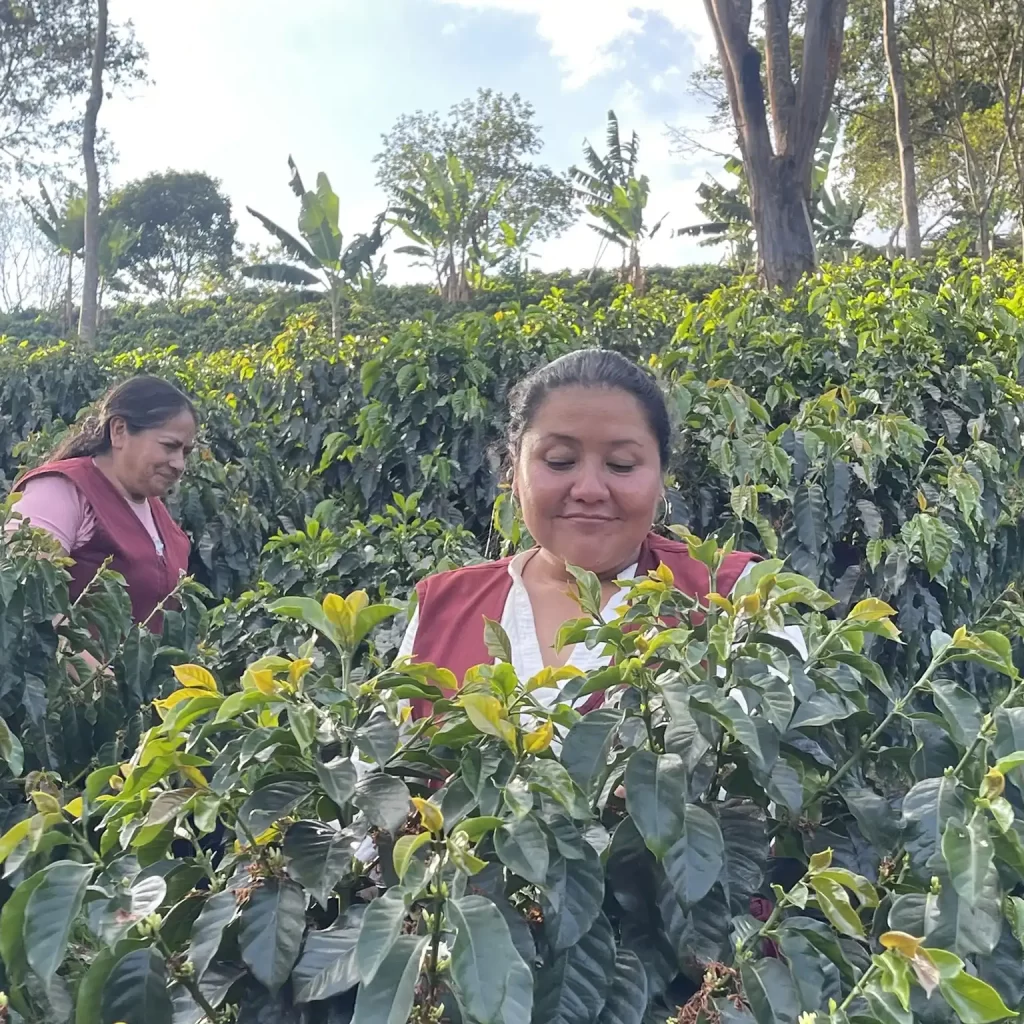
Maria Elicenia Chilito
Farmer Elicenia, full name Maria Elicenia Chilito Guaca, is a relatively young and very cheerful coffee farmer. We met her at the end of 2022 thanks to the initiative Campamento de Mujeres Cafeteras (Coffee Women’s Camp), founded by “our” Ana Gloria. Elicenia and her husband run a small farm with a smile, and together with their entire family, they are diving into the production of specialty coffee. They are passionate about their work and eager to improve every step of the process, from farming practices to coffee processing. Elicenia instills a love for agriculture in all her children, as well as a sense of responsibility, which she considers vital.
She teaches her children that even in rural areas, they can have a bright future. Each of her children is responsible for their own coffee lot, but she also emphasizes the importance of education, ensuring all of them pursue their studies.
As a young girl, she never imagined she would remain in the countryside, even though she grew up among coffee plants. Her grandparents were coffee farmers, but like many others, she dreamed of moving to the city “for a better future” as she was growing up. At the age of 18, her parents paid for her studies in the nearby town of Pitalito. Alongside her schooling, she also took a course focused on coffee quality control, and that’s when she fell in love with the world of coffee. She began to appreciate coffee and the work of her parents and grandparents more deeply and continued her education in coffee production. Gradually, she also started exploring the realm of specialty coffee.
It was during one of these coffee courses that she met her current husband. After a few years of working in the industry in the city, she decided it was time to return to the farm. Her husband already owned some land, and together they planted more coffee trees and gradually purchased additional plots of land.
ABOUT OUR BEGINNINGS
It has been, and still is, challenging, but we always hoped to find people who would appreciate our work. In the future, we would like to run agrotourism and produce coffee of the highest quality. My dream is to pass on my knowledge to children and young people in our community, to have our own coffee lab with a roaster, and to be able to offer a complete service. I also dream that our coffee will be known around the world, and that through it, I’ll have the chance to explore the world myself.
We bought the farm together with my husband. Thanks to his work, where he took jobs on nearby farms, we were able to gradually pay off the first part of the farm. For the second part, we took out a loan, which we split between us and are still repaying.
When we moved to the farm, there was no infrastructure here—no house, and the beneficiadero (the coffee processing facility) was in poor condition. We only had a small tank and a basic depulper. There were very few coffee plants on our land, just a few trees of the Caturra variety.
Today, we have new, eco-friendly coffee processing equipment called the “eco-mill.” It consists of four stainless steel tanks with its own washing station. This machinery is environmentally responsible, as it uses almost no water. For drying, we have African beds and a mechanical dryer.
About the coffee
Harvesting and processing on the farm are very traditional and typical for small farms in Colombia. After the cherries are handpicked, farmers spread them out in the shade on tarps, usually for one day. On the second day, the cherries are poured into a tank and left there for the entire day. On the third day, the coffee cherries are depulped using a mechanical mill, and the depulped beans are transferred into large stainless steel tanks, where they remain submerged in water for another day. The following day, the beans are washed and immediately spread out to gradually dry.
After being harvested, the cherries were left in the shade, exposed to fresh air, for a full 24 hours. They then spent another 24 hours in the tanks of the eco-mill. On the third day, the cherries were depulped, and the beans remained submerged in water for another 24 hours. On the fourth day, the beans were washed, and the drying process began, which lasted 10 days. After that, the coffee was stored in parchment for one month.
Pink Bourbon, was harvested, floated, left in cherry form in a tank to oxidize for 48 hours. Then, it was pulped and left to ferment dry in the tank without water until the next day. It was washed in a traditional manner and placed in the dryer. The drying process took 15 days in the drying area.
For wastewater, the farm uses a sedimentation filter. The farm also uses a device to remove coffee mucilage through centrifugal force, known as a demucilager, to reduce water waste and contamination. The coffee mucilage residues are dried and added to compost.


